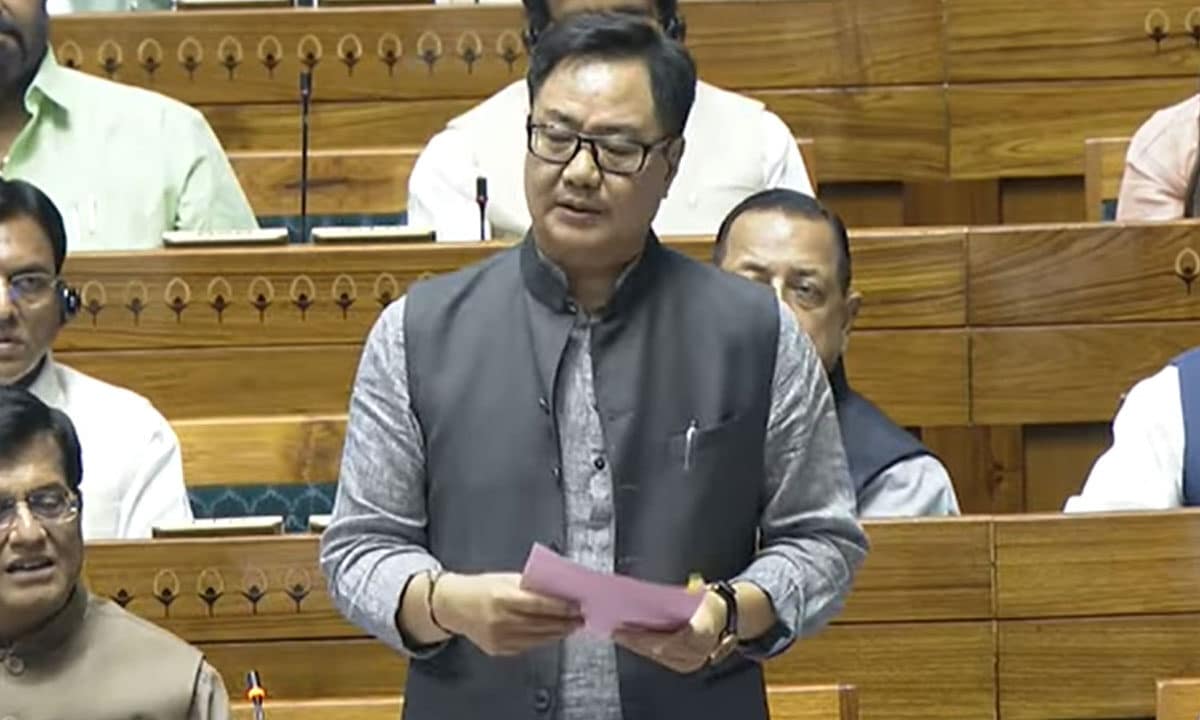
New Delhi, Apr 2 (PTI): The Union Minority Affairs Minister, Kiren Rijiju, tabled the Waqf (Amendment) Bill, 2025, in the Lok Sabha on Wednesday. The bill aims to enhance the management of Waqf properties, streamline operations, introduce transparency, and implement technology-driven oversight.
Table of Contents
However, the move faced stiff opposition from several political parties, leading to heated discussions in the House.
Bill Focuses on Property, Not Religion: Rijiju
Defending the bill amid opposition uproar, Rijiju clarified that the legislation pertains solely to Waqf properties and does not interfere in religious matters. “The government is not going to interfere in any religious institution. The amendments were necessary as the previous changes made by the UPA government had given Waqf overriding authority over other statutes,” Rijiju asserted. He also accused the opposition of misleading the public about the bill’s provisions.
Extensive Consultation Process Undertaken
The bill, reviewed and revised by a Joint Parliamentary Committee (JPC), underwent what Rijiju described as the most extensive consultation in Indian parliamentary history. According to the minister:
- Over 97.27 lakh petitions and memorandums were received in physical and online formats.
- 284 delegations presented their views on the bill.
- Waqf Boards from 25 states and Union Territories provided their feedback.
- Experts, academicians, and religious leaders also contributed to the discussions.
Waqf Properties and Their Economic Potential
Highlighting the vast pool of Waqf properties, Rijiju noted that they form the third-largest landholding in India after the Railways and Defence. As of 2004, 4.9 lakh Waqf properties generated an annual income of only Rs 163 crore. After the 2013 amendment, this amount marginally increased to Rs 166 crore. Rijiju contended that the potential revenue from these properties should be at least Rs 12,000 crore, arguing that efficient management could significantly benefit poor and marginalized Muslims.
Key Provisions of the Bill
The proposed legislation includes several significant changes:
- Limitation Act, 1963, to Apply: This will reduce prolonged litigation over Waqf property claims.
- Waqf Tribunals Strengthened: A structured selection process and fixed tenure will be introduced to ensure efficient dispute resolution.
- State Governments to Appoint Waqf Boards: Waqf boards will function under state authority rather than central government control.
- Protection of Tribal Areas: No property in tribal regions can be declared as Waqf land.
- Transparency and Auditing: Waqf institutions earning over Rs 1 lakh will be subject to state-sponsored audits, and a centralised portal will automate Waqf property management.
- Changes to Property Dedication Rules: Only practising Muslims (for at least five years) will be allowed to dedicate property to Waqf, restoring pre-2013 regulations.
- Ensuring Women’s Rights: Women must receive their inheritance before any Waqf declaration, with special provisions for widows, divorced women, and orphans.
- Non-Muslim Representation: Non-Muslim members will be included in central and state Waqf boards for broader inclusivity.
Eliminating ‘Draconian’ Provisions
Rijiju criticized Section 40 of the previous Waqf Act, which empowered Waqf Boards to unilaterally declare properties as Waqf land. Citing past incidents, he mentioned how a gurdwara in Haryana and properties of 600 families in Kerala were allegedly misclassified under this provision. The new amendment seeks to replace this system with a process where a senior government official will have the final authority on property disputes.
New Name for the Bill: ‘UMEED’
The minister announced that the Waqf (Amendment) Bill will be renamed as Unified Waqf Management Empowerment, Efficiency, and Development (UMEED) Bill, signaling a focus on efficiency and inclusivity.
Opposition’s Strong Resistance
Despite the government’s assurances, opposition leaders strongly criticized the bill, alleging that it disproportionately targets Waqf institutions. Speaker Om Birla rejected objections regarding the government’s power to insert new provisions in the amended bill.
Union Home Minister Amit Shah defended the legislation, stating that the bill was introduced only after thorough consultation and approval by the Union Cabinet. “This committee followed democratic procedures and consultations, unlike past Congress-led committees,” Shah said.
Next Steps
With tensions running high, the Waqf (Amendment) Bill, 2025, is expected to face further deliberations before being put to vote. The outcome will determine the future regulatory framework for Waqf properties and their administration in India.
